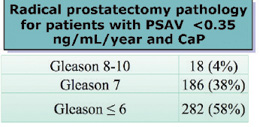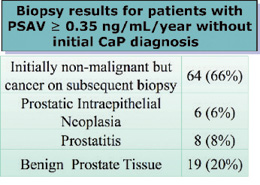PSAV Is A Useful Tool

Prostate-Specific Antigen Velocity (PSAV) is used to assist in prostate cancer (CaP) detection and in biopsy recommendations.
PSAV is the rate at which PSA levels rise. The NCCN (National Comprehensive Cancer Network) 2010 Guideline for early detection of prostate cancer recommends a biopsy be considered in patients with a PSAV of 0.35 or more ng/mL/year.
In order to guide clinical application of this useful screening tool and to respond to recent questions regarding the use of PSAV in CaP screening, the URF studied 1476 patients with an elevated PSAV but no cancer on biopsy and patients with a nonelevated PSAV but cancer on biopsy.
One significant finding was that two-thirds of patients with elevated PSAV and initial negative biopsies were diagnosed with prostate cancer later in their follow up.
Closely following a patient with an elevated PSAV is important because the long-term risk of developing CaP was quite high.
Another finding was that 71% of patients with low PSAV and a diagnosis of cancer had less aggressive tumor characteristics in their prostatectomy samples.
Thus, in patients without high-grade disease on biopsy, a low pre-diagnosis PSAV may be associated with a less significant tumor type.
Non-elevated PSAV was associated with aggressive tumor types in only 4% of patients.
The conclusion of this study is that PSAV is a useful tool:

 Low PSAV in the setting of non-high grade tumor on biopsy may guide patient counseling, as low PSAV is most commonly associated with potentially less clinically significant cancer.
Low PSAV in the setting of non-high grade tumor on biopsy may guide patient counseling, as low PSAV is most commonly associated with potentially less clinically significant cancer.
And, very important, physicians should be wary of future prostate cancer in patients with elevated PSAV with an initial non-cancerous biopsy.
based upon presentation at May, 2011 AUA meeting: Possible Pitfalls in Using Prostate-Specific Antigen Velocity for Detection of Prostate Cancer Gregory B. Auffenberg, MD; Joshua J. Meeks, MD; Phillip R. Cooper, Qiaoyan Hu; Cheng Li, MD; William J. Catalona, MD, Chicago, IL











